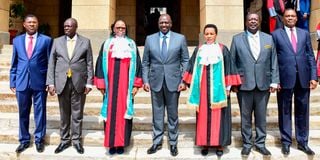Premium
Win for criminal justice as Judiciary budget rises by Sh4.3bn in Ruto's first budget

President William Ruto, Deputy President Rigathi Gachagua, Chief Justice Martha Koome, Deputy Chief Justice Philemona Mwilu, Chief Cabinet Secretary Musalia Mudavadi, Speaker of the National Assembly Moses Wetangula and Attorney General Justin Muturi after the launch of The Judiciary and the Administration of Justice Report for Financial Year 2021/22 at Supreme Court, Nairobi.
The Judiciary has been allocated Sh23.2 billion in this year's budget, an increase of about Sh4.3 billion from what the courts were allocated in the last budget.
The judiciary has been asking for more money to fund its operations but has always been allocated less than the amount requested.
President William Ruto had promised in November last year to increase the Judiciary's annual budget by Sh3 billion every year "to enable it to fulfil its mandate".
“Further, the Government escalated the actualisation of the Judiciary Fund that will increase allocation of resources towards enhancing access to justice,” Prof Ndung’u said in his budget speech on Thursday.
The Judiciary Fund was operationalised in July last year, ending a tussle between the executive and the judiciary over its actualisation.
Article 173 of the Constitution established the fund, to be administered by the Chief Registrar of the Judiciary, to meet the administrative costs of the courts.
Financial autonomy
However, its establishment has been delayed over the years due to the lack of an account and regulations to guide its operations, as the judiciary argued that it needed financial autonomy as a critical aspect of judicial independence.
The CS also asked Parliament to allocate Sh3.9 billion to the Ethics and Anti-Corruption Commission (EACC) to “enhance good governance and scale up fight against corruption”.
Prof Ndung'u also proposed an allocation of Sh3.6 billion for the Office of the Directorate of Public Prosecutions, Sh8 billion for the Criminal Investigations Services and a similar amount for the Office of the Auditor General.
The CS said to reduce money laundering vulnerability, the Central Bank of Kenya (CBK) has reviewed and enhanced the banking sector Know Your Customer (KYC) and customer due diligence processes.
“This will further strengthen the effectiveness of the banking sector anti-money laundering and combating the financing of terrorism and proliferation financing Anti-Money Laundering/Combating the Financing of Terrorism (AML/CFT/PF) risk-based supervisory framework,” the CS said.





